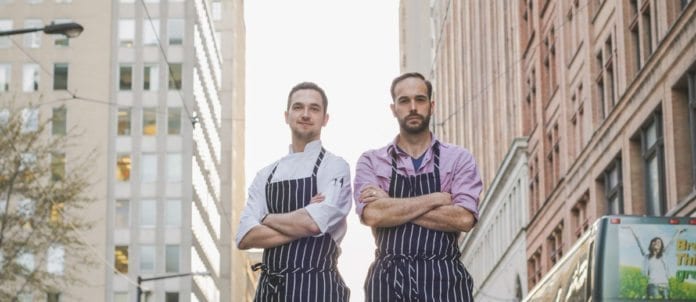The owners of Toronto’s Richmond Station have one goal: It’s that “every person who comes into the restaurant enjoys their time here, leaves happy and wants to come back,” says Carl Heinrich (pictured, far left and bottom right), executive chef and co-owner. “That doesn’t stop at the customer,” adds Heinrich. “That includes the staff, too.”
Keeping employees happy and motivated has been a focus at Richmond Station since it opened in October 2012. Heinrich, who’s worked in kitchens since he was 13, says his past experience inspired Richmond Station’s approach to staff development. “[Being a cook] is a lot of hard work [without] a lot of pay,” he says, adding that he often felt he didn’t care about his employer or co-workers. “I don’t want that to happen to my staff. I want my staff to want to come to work every day and want to be better.”
In an industry with high turnover, Richmond Station retains staff with a culture that treats employees as partners, fostering learning opportunities. “We try to provide what wasn’t provided to us,” says Ryan Donovan, co-owner and head butcher (pictured, left). “Sometimes that’s better pay. More often, that’s simply showing a keen interest in someone’s ambitions and continually challenging them.”
For example, Farzam Fallah (pictured, above), the restaurant’s 22-year-old pastry chef, earns a percentage of pastry sales. “He’s just so creative, and his passion and dedication is off the charts,” says Heinrich. “We figured out quickly that it’s going to take a lot to keep him.”
And that doesn’t just mean money: the partners want to ensure Fallah is continually learning. “We knew he’d get to a point where he’s learned everything, and I can no longer teach him,” says Heinrich. “So to keep him excited, we looked at the business side of things. We started teaching him what sales mean, and his pay is now directly related to the pastry he sells.”
On-the-job learning is another key way to motivate and retain staff — and it doesn’t always take place at Richmond Station. For example, Hayden Johnston, chef de cuisine, staged at New York City restaurants Blue Hill and Blue Hill Stone Barns last year. The Richmond Station owners gave Johnston time off and paid for his hotel and airfare. “We want our staff to come to work with ideas, confidence, excitement and a full understanding that they have the opportunity to implement their new ideas,” says Donovan.
Formal education is also part of staff development. For example, when Julia Ayearst, front-of-house manager, wanted to learn more about wine, Richmond Station funded her Independent Wine Education Guild diploma certification. “This has improved our wine program but also sets the example to everyone that continued improvement is expected,” says Donovan.
The Richmond Station owners spend approximately $10,000 to $15,000 a year on giving their staff new experiences. While it’s hard to gauge the impact on the bottom line, the investment is proving worthwhile. “I know that if [our employees are] learning new things and continuing to grow, they’re only going to make our restaurant better,” Heinrich says.





















